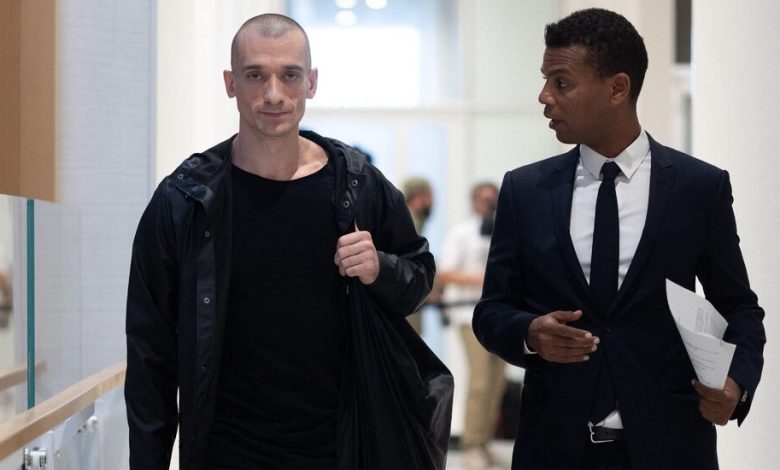Artist Is Found Guilty in French Sex Tape Scandal

The Russian artist Pyotr Pavlensky was convicted on privacy invasion and consent laws in France after publishing intimate texts and videos of a politician for an art performance that he titled “Pornopolitics.”
A French court issued the decision last week, ending a three-year legal battle that halted the political ambitions of Benjamin Griveaux, an ally of President Emmanuel Macron and a Paris mayoral candidate in 2020. Mr. Griveaux ended his race shortly after Mr. Pavlensky published the explicit images.
The court said Mr. Pavlensky violated the private life of a politician by publishing “images of the strictest privacy that were obtained clandestinely,” adding that Mr. Pavlensky did so “under the guise of an artistic project.”
Mr. Pavlensky received a six-month prison sentence and will most likely serve that time under house arrest. Alexandra de Taddeo, a former lover of Mr. Griveaux’s who received the sexual messages from the politician and is now dating Mr. Pavlensky, was also convicted of privacy violations and received a suspended six-month prison penalty. The defendants have each been ordered to pay 15,000 euros, or $15,750 in damages, and €5,000 in legal fees.
During a phone interview, the couple stood by their decision to publish the intimate videos.
“I don’t feel like I should regret anything,” Ms. de Taddeo said.
Mr. Pavlensky said: “Regret? Of course not. This was my big success.”
“On the internet,” he said, “you can find any type of pornographic content but none with politicians. I managed to create that.”
Richard Malka, a lawyer representing Mr. Griveaux, said in a statement that his client was “satisfied that justice has been done,” but that the “wrongs that have been caused to him will never be repaired.”
Through the early 2010s, Mr. Pavlensky was one of Russia’s most outspoken artists. He frequently protested the government with acts of self-mutilation. In 2012, he sewed his mouth shut to protest the detainment of members of the Russian art collective Pussy Riot. The next year, Mr. Pavlensky wrapped himself in barbed wire outside the Legislative Assembly of St. Petersburg and nailed his scrotum to the stone pavement outside of Lenin’s Mausoleum in Moscow’s Red Square.
“The legal system is an instrument of power and therefore my task is to make this instrument work for art,” Mr. Pavlensky said.
Mr. Pavlensky came to France in 2017 after being granted political asylum amid sexual assault allegations from an actress in Moscow, which he denied.
Trouble with the French authorities soon followed. That same year, Mr. Pavlensky set fire to a branch of the Banque de France in Paris. A video showed him standing in the doorway as flames grew around him; an accompanying text described the work as “Lighting,” declaring the bank a symbol of modern-day tyranny. He was sentenced to three years in prison but served only one, during his pretrial detention.
Mr. Pavlensky considers his experience in the legal system as part of the performance, and the courtroom as merely another stage. During his recent trial, his witnesses included three actors who recited lines from “Tartuffe,” a 17th-century satirical play by Molière that comments on morality and hypocrisy.
“The testimonies heard added nothing to the debates,” the court said in its decision.
With planned exhibitions, an upcoming documentary and a book detailing the artistic theories behind his provocative performances, the artist intends to disagree with the courts by highlighting the nature of its power.
“I’m not the first artist who has been convicted and I’m not the last,” Mr. Pavlensky said. “That’s the artist’s life. Because the judge’s sentence is always the last point in my artworks. That’s why I’m not going to appeal the decision.”



